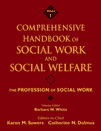Social Policy from a Global Perspective
Abstract
Social workers are challenged every day to consider the global and international aspects of their practice. Many social workers now work with immigrants, refugees, and survivors of torture and trauma from other parts of the globe. A client's residence status can help or hinder treatment or access to service. Families often have to deal with adjustments to live in the United States, while their relatives are struggling in another country. Detention centers that house new asylees or refugees have become a permanent part of our urban landscape.
International social work is not a new idea or field of practice. A number of social work professionals have been interested in understanding the international dimensions of social work practice since social work gained professional status. Social workers' involvement in international collaboration began after World War I as evidenced by the establishment of several international organizations, such as the International Federation of Social Work and the International Association of Schools of Social Work. This involvement increased after World War II as social workers became involved with rebuilding efforts after the War and with the United Nations. This involvement waxed and waned over the years, but is now coming more to the forefront as social workers realize that the idea that we work only within the boundaries of our own nation-states is no longer true. Influences beyond our borders are increasingly acknowledged as having a direct influence on local and national issues. The process underlying these changes is globalization.



